I reckon most readers are already familiar with the concept that everything we do, especially the more elaborate endeavours, always happens three times.
First, in our mind as a mental construct. A thought. An idea.
Second, as a written plan on paper, as we organise our thoughts to formulate our strategy ~ to put it to work in some way.
Third & finally, as a physical reality, when we are executing our plan in the real world, business or otherwise.
From my personal as well as professional experiences (as a task commander & trouble shooter in the corporate world), all three parts are critical components in the entire strategy for
 mulation
mulation & execution process. I am sure
Dilip concurs with me.
The first part involves the ability to see the whole thing in one's mind's eye, so to speak. Not only that, catching a soft glimpse of it in the first place counts too.
Therefore, suffice to say, if we don't see it, we don't get it.
Dilip & I have come to the conclusion from our many recent encounters that there are actually people out there - supposedly intellectual ones, holding
MBA's - who don't get it at all, despite the fact that we have done our best to paint the scenarios for them.
Oftentimes, they like to ask for more "information", thinking that more "information" will help in decision making. They don't realise that, as long as they don't know how to use the given "information", i.e. how to draw pertinent insights or "connect the dots", so to speak, the given "information" is just "data".
As a result, they end up unwittingly in data-smog.
At this juncture, I like to make a distinction:
- "data" is raw & neutral to everyone;
- "information" is what you have made sense of the given "data";
- interpreting "data" requires imagination as well as ingenuity, because you need to see the "form" first, which is a root in "in-form-
ation".
Seeing can seemingly be a tough problem for many people, especially those who have low default setting.
Dilip likes to use the analogy of the thermostat.
With low settings, they can only see ahead all within the scope of their own self-imposed limits.
"Closed minds" is another category of people in similar fashion. "A frog in the well" comes to mind too.
Worst still, there is another category - those with "truncated perspectives".
Creativity guru Edward
de bono has spent his entire professional life talking about this critical issue, which he calls "the perceptual phase of thinking".
Other experts have taken a different & creative spin to the phenomenon. They include:
Mark Brown,
Joel Arthur Barker,
Wayne Burkan,
Jay Abraham,
John Hagel,
John Seely Brown, &
Erich Joachimsthaler, just to name a few.
I have in fact written at length on their observations in this weblog as well as in the
'Optimum Performance Technologies' weblog.
To me, seeing clearly is always driven - & fueled - by our curiosity or inquisitiveness ~ our sense of wonder & sense of discovery. Our passion as a whole.
That's why most experts maintain that we should continue to be child-like as we move into our adulthood, but remember, don't be childish.
You can pose yourself a couple of self-check questions to help you see better:
- what do I choose to see?
- where do I direct my attention?
I am confident by doing this regular self-check on your own, you can get out of what I call the
'Tetris Effect'.
The second part involves clarity of thought.
To me, clarity comes from seeing - & understanding - the big picture, as well as figuring out all the specific tasks, big & small, that are needed to be done in order to attain the results we want.
That is, seeing the forest & the trees.
To use an interesting analogy from
Minister Mentor Lee Kuan Yew, we must have the "analytical ability", "helicopter ability", "imagination" as well as "realism" ~ having a good feel of the pulse on the ground.
Without sounding too arrogant, some people are just too muddle-headed when it comes down to planning. Sad to say, they like to go in all directions.
"Multi-tasking", they say in defence of what they are doing. As a result, nothing works.
Worst still, unintended delays always come to play.
To me, this is primarily a problem of attentional focus on priorities. What matters most, so to speak.
Productivity guru
Stephen Covey has done a lot of work here. Go & digest his potent stuff, especially understanding his
'Four Quadrants'.
Once we can stay focused on our priorities & objectives, it is very easy for us to be flexible in our approach with problems or challenges that pop up along the way. More importantly, to deal with the major issue at hand.
I reckon the following self-check questions can help in developing your power of clarity:
- what do I really want?
- what do I believe?
The third & final part involves action-mindedness. Move it, as the four characters in the
Magadascar movies love to sing along, to be more precise.
Some people often get stuck with too much logical thinking, & often find themselves hard to move their butts. So, they stay put, & create unnecessary inconvenience to others who happen to be their collaborators.
Do these people - I like to call them,
bench warmers & fence sitters - fear the unknown? Maybe so, or more likely, they just love to stay in the comfort zone.
Others are too focused on the "negatives", & as a result of which, they can't seem to see the "positives" &/or "interesting aspects" at all, resulting in inaction on their part.
One particular sage advice I have always followed all these years is that "Action has Consequences".
The consequences can go either way, good or bad. What we can learn from the consequences of completed actions are:
- what works?
- what doesn't work? Why?
- what can we do now to make it work better next time?
Without action, nothing moves. I believe
Einstein once said that too.
It is pertinent for me to highlight that moving - or getting things done - is just one thing, finishing what we have started in the first place is significant too.
In other words, successful endeavours depend on the initial move, as well as the next one, & all subsequent moves.
More explicitly, success in any endeavours is always a function of correction. It is natural to stay off course, even for a rocket that goes to the moon. Hence, making corrections & adjustments along the way is part & parcel of the long haul.
There is another interesting perspective to this phenomenon.
To draw an
analogy: you are either at 211 or 212. For the uninitiated: water is hot at 211 degrees, but boils at 212 degrees. And with boiling water, comes steam... steam can power a locomotive. The one extra degree makes the difference.
I reckon Sam Parker & Mac Anderson, who initiated this concept of
212: The Extra Degree, said it best:
"212° is not only a message of action - it's a message of persistent and additional action - the continual application of heat (effort) to whatever task or activity you undertake in order to achieve not only the primary objective you seek, but to reap the exponential rewards that are possible by applying one extra degree of effort."
In other words, staying on course with persistence & perseverance really counts at the end of the day.
It is pertinent for me to highlight that, sometimes, we need to channel our concerted efforts on the small, manageable tasks first, prior to gaining sustainable leverage to gradually conquer the larger ones.

Peak performance experts call this the
'Zorro's Circle'.
Have you watched the entertaining swashbuckling movie,
'The Mask of Zorro'?
In the movie,
Anthony Hopkins, who played Don Diego
de la Vega, aka "Zorro Senior", took under his personal tutelage a drunken convict, Alejandro, played by
Antonio Banderas, who had once saved his life.
Both had a
common agenda: revenge against the Spanish governor & his henchmen, but the older "Zorro Senior" wanted to train Alejandro as his replacement, "Zorro Junior", so that both could achieve their aims together.
Unfortunately, Alejandro was obsessed by personal
vengeance & was really out of control.
That's when "Zorro Senior" taught "Zorro Junior" the reality of "what is the point of power when there is no control". In the movie, he called it the
Training Circle... the
Master's Wheel.
I recommend readers to go & watch - or
rewatch - the movie.
Unfortunately, there are also some people out there who like to stick to the old way of doing things, despite knowing the fact that the novel approach produces more benefits.
They choose to hold the dogged view that the past = the future.
So, they like to go out there to do what they have done before, & yet expect to get new results.
Einstein once illustrated this as "temporary insanity".
Professor
Don Sull of the
London Business School calls it "active inertia".
I trust readers can draw some useful lessons from my foregoing rambling musing about our propensity to see, to move & to finish.
 mulation & execution process. I am sure Dilip concurs with me.
The first part involves the ability to see the whole thing in one's mind's eye, so to speak. Not only that, catching a soft glimpse of it in the first place counts too.
Therefore, suffice to say, if we don't see it, we don't get it.
Dilip & I have come to the conclusion from our many recent encounters that there are actually people out there - supposedly intellectual ones, holding MBA's - who don't get it at all, despite the fact that we have done our best to paint the scenarios for them.
Oftentimes, they like to ask for more "information", thinking that more "information" will help in decision making. They don't realise that, as long as they don't know how to use the given "information", i.e. how to draw pertinent insights or "connect the dots", so to speak, the given "information" is just "data".
As a result, they end up unwittingly in data-smog.
At this juncture, I like to make a distinction:
- "data" is raw & neutral to everyone;
- "information" is what you have made sense of the given "data";
- interpreting "data" requires imagination as well as ingenuity, because you need to see the "form" first, which is a root in "in-form-ation".
Seeing can seemingly be a tough problem for many people, especially those who have low default setting. Dilip likes to use the analogy of the thermostat.
With low settings, they can only see ahead all within the scope of their own self-imposed limits.
"Closed minds" is another category of people in similar fashion. "A frog in the well" comes to mind too.
Worst still, there is another category - those with "truncated perspectives".
Creativity guru Edward de bono has spent his entire professional life talking about this critical issue, which he calls "the perceptual phase of thinking".
Other experts have taken a different & creative spin to the phenomenon. They include: Mark Brown, Joel Arthur Barker, Wayne Burkan, Jay Abraham, John Hagel, John Seely Brown, & Erich Joachimsthaler, just to name a few.
I have in fact written at length on their observations in this weblog as well as in the 'Optimum Performance Technologies' weblog.
To me, seeing clearly is always driven - & fueled - by our curiosity or inquisitiveness ~ our sense of wonder & sense of discovery. Our passion as a whole.
That's why most experts maintain that we should continue to be child-like as we move into our adulthood, but remember, don't be childish.
You can pose yourself a couple of self-check questions to help you see better:
- what do I choose to see?
- where do I direct my attention?
I am confident by doing this regular self-check on your own, you can get out of what I call the 'Tetris Effect'.
The second part involves clarity of thought.
To me, clarity comes from seeing - & understanding - the big picture, as well as figuring out all the specific tasks, big & small, that are needed to be done in order to attain the results we want.
That is, seeing the forest & the trees.
To use an interesting analogy from Minister Mentor Lee Kuan Yew, we must have the "analytical ability", "helicopter ability", "imagination" as well as "realism" ~ having a good feel of the pulse on the ground.
Without sounding too arrogant, some people are just too muddle-headed when it comes down to planning. Sad to say, they like to go in all directions.
"Multi-tasking", they say in defence of what they are doing. As a result, nothing works.
Worst still, unintended delays always come to play.
To me, this is primarily a problem of attentional focus on priorities. What matters most, so to speak.
Productivity guru Stephen Covey has done a lot of work here. Go & digest his potent stuff, especially understanding his 'Four Quadrants'.
Once we can stay focused on our priorities & objectives, it is very easy for us to be flexible in our approach with problems or challenges that pop up along the way. More importantly, to deal with the major issue at hand.
I reckon the following self-check questions can help in developing your power of clarity:
- what do I really want?
- what do I believe?
The third & final part involves action-mindedness. Move it, as the four characters in the Magadascar movies love to sing along, to be more precise.
Some people often get stuck with too much logical thinking, & often find themselves hard to move their butts. So, they stay put, & create unnecessary inconvenience to others who happen to be their collaborators.
Do these people - I like to call them, bench warmers & fence sitters - fear the unknown? Maybe so, or more likely, they just love to stay in the comfort zone.
Others are too focused on the "negatives", & as a result of which, they can't seem to see the "positives" &/or "interesting aspects" at all, resulting in inaction on their part.
One particular sage advice I have always followed all these years is that "Action has Consequences".
The consequences can go either way, good or bad. What we can learn from the consequences of completed actions are:
- what works?
- what doesn't work? Why?
- what can we do now to make it work better next time?
Without action, nothing moves. I believe Einstein once said that too.
It is pertinent for me to highlight that moving - or getting things done - is just one thing, finishing what we have started in the first place is significant too.
In other words, successful endeavours depend on the initial move, as well as the next one, & all subsequent moves.
More explicitly, success in any endeavours is always a function of correction. It is natural to stay off course, even for a rocket that goes to the moon. Hence, making corrections & adjustments along the way is part & parcel of the long haul.
There is another interesting perspective to this phenomenon.
To draw an analogy: you are either at 211 or 212. For the uninitiated: water is hot at 211 degrees, but boils at 212 degrees. And with boiling water, comes steam... steam can power a locomotive. The one extra degree makes the difference.
I reckon Sam Parker & Mac Anderson, who initiated this concept of 212: The Extra Degree, said it best:
"212° is not only a message of action - it's a message of persistent and additional action - the continual application of heat (effort) to whatever task or activity you undertake in order to achieve not only the primary objective you seek, but to reap the exponential rewards that are possible by applying one extra degree of effort."
In other words, staying on course with persistence & perseverance really counts at the end of the day.
It is pertinent for me to highlight that, sometimes, we need to channel our concerted efforts on the small, manageable tasks first, prior to gaining sustainable leverage to gradually conquer the larger ones.
mulation & execution process. I am sure Dilip concurs with me.
The first part involves the ability to see the whole thing in one's mind's eye, so to speak. Not only that, catching a soft glimpse of it in the first place counts too.
Therefore, suffice to say, if we don't see it, we don't get it.
Dilip & I have come to the conclusion from our many recent encounters that there are actually people out there - supposedly intellectual ones, holding MBA's - who don't get it at all, despite the fact that we have done our best to paint the scenarios for them.
Oftentimes, they like to ask for more "information", thinking that more "information" will help in decision making. They don't realise that, as long as they don't know how to use the given "information", i.e. how to draw pertinent insights or "connect the dots", so to speak, the given "information" is just "data".
As a result, they end up unwittingly in data-smog.
At this juncture, I like to make a distinction:
- "data" is raw & neutral to everyone;
- "information" is what you have made sense of the given "data";
- interpreting "data" requires imagination as well as ingenuity, because you need to see the "form" first, which is a root in "in-form-ation".
Seeing can seemingly be a tough problem for many people, especially those who have low default setting. Dilip likes to use the analogy of the thermostat.
With low settings, they can only see ahead all within the scope of their own self-imposed limits.
"Closed minds" is another category of people in similar fashion. "A frog in the well" comes to mind too.
Worst still, there is another category - those with "truncated perspectives".
Creativity guru Edward de bono has spent his entire professional life talking about this critical issue, which he calls "the perceptual phase of thinking".
Other experts have taken a different & creative spin to the phenomenon. They include: Mark Brown, Joel Arthur Barker, Wayne Burkan, Jay Abraham, John Hagel, John Seely Brown, & Erich Joachimsthaler, just to name a few.
I have in fact written at length on their observations in this weblog as well as in the 'Optimum Performance Technologies' weblog.
To me, seeing clearly is always driven - & fueled - by our curiosity or inquisitiveness ~ our sense of wonder & sense of discovery. Our passion as a whole.
That's why most experts maintain that we should continue to be child-like as we move into our adulthood, but remember, don't be childish.
You can pose yourself a couple of self-check questions to help you see better:
- what do I choose to see?
- where do I direct my attention?
I am confident by doing this regular self-check on your own, you can get out of what I call the 'Tetris Effect'.
The second part involves clarity of thought.
To me, clarity comes from seeing - & understanding - the big picture, as well as figuring out all the specific tasks, big & small, that are needed to be done in order to attain the results we want.
That is, seeing the forest & the trees.
To use an interesting analogy from Minister Mentor Lee Kuan Yew, we must have the "analytical ability", "helicopter ability", "imagination" as well as "realism" ~ having a good feel of the pulse on the ground.
Without sounding too arrogant, some people are just too muddle-headed when it comes down to planning. Sad to say, they like to go in all directions.
"Multi-tasking", they say in defence of what they are doing. As a result, nothing works.
Worst still, unintended delays always come to play.
To me, this is primarily a problem of attentional focus on priorities. What matters most, so to speak.
Productivity guru Stephen Covey has done a lot of work here. Go & digest his potent stuff, especially understanding his 'Four Quadrants'.
Once we can stay focused on our priorities & objectives, it is very easy for us to be flexible in our approach with problems or challenges that pop up along the way. More importantly, to deal with the major issue at hand.
I reckon the following self-check questions can help in developing your power of clarity:
- what do I really want?
- what do I believe?
The third & final part involves action-mindedness. Move it, as the four characters in the Magadascar movies love to sing along, to be more precise.
Some people often get stuck with too much logical thinking, & often find themselves hard to move their butts. So, they stay put, & create unnecessary inconvenience to others who happen to be their collaborators.
Do these people - I like to call them, bench warmers & fence sitters - fear the unknown? Maybe so, or more likely, they just love to stay in the comfort zone.
Others are too focused on the "negatives", & as a result of which, they can't seem to see the "positives" &/or "interesting aspects" at all, resulting in inaction on their part.
One particular sage advice I have always followed all these years is that "Action has Consequences".
The consequences can go either way, good or bad. What we can learn from the consequences of completed actions are:
- what works?
- what doesn't work? Why?
- what can we do now to make it work better next time?
Without action, nothing moves. I believe Einstein once said that too.
It is pertinent for me to highlight that moving - or getting things done - is just one thing, finishing what we have started in the first place is significant too.
In other words, successful endeavours depend on the initial move, as well as the next one, & all subsequent moves.
More explicitly, success in any endeavours is always a function of correction. It is natural to stay off course, even for a rocket that goes to the moon. Hence, making corrections & adjustments along the way is part & parcel of the long haul.
There is another interesting perspective to this phenomenon.
To draw an analogy: you are either at 211 or 212. For the uninitiated: water is hot at 211 degrees, but boils at 212 degrees. And with boiling water, comes steam... steam can power a locomotive. The one extra degree makes the difference.
I reckon Sam Parker & Mac Anderson, who initiated this concept of 212: The Extra Degree, said it best:
"212° is not only a message of action - it's a message of persistent and additional action - the continual application of heat (effort) to whatever task or activity you undertake in order to achieve not only the primary objective you seek, but to reap the exponential rewards that are possible by applying one extra degree of effort."
In other words, staying on course with persistence & perseverance really counts at the end of the day.
It is pertinent for me to highlight that, sometimes, we need to channel our concerted efforts on the small, manageable tasks first, prior to gaining sustainable leverage to gradually conquer the larger ones.
 Peak performance experts call this the 'Zorro's Circle'.
Have you watched the entertaining swashbuckling movie, 'The Mask of Zorro'?
In the movie, Anthony Hopkins, who played Don Diego de la Vega, aka "Zorro Senior", took under his personal tutelage a drunken convict, Alejandro, played by Antonio Banderas, who had once saved his life.
Both had a common agenda: revenge against the Spanish governor & his henchmen, but the older "Zorro Senior" wanted to train Alejandro as his replacement, "Zorro Junior", so that both could achieve their aims together.
Unfortunately, Alejandro was obsessed by personal vengeance & was really out of control.
That's when "Zorro Senior" taught "Zorro Junior" the reality of "what is the point of power when there is no control". In the movie, he called it the Training Circle... the Master's Wheel.
I recommend readers to go & watch - or rewatch - the movie.
Unfortunately, there are also some people out there who like to stick to the old way of doing things, despite knowing the fact that the novel approach produces more benefits.
They choose to hold the dogged view that the past = the future.
So, they like to go out there to do what they have done before, & yet expect to get new results.
Einstein once illustrated this as "temporary insanity".
Professor Don Sull of the London Business School calls it "active inertia".
I trust readers can draw some useful lessons from my foregoing rambling musing about our propensity to see, to move & to finish.
Peak performance experts call this the 'Zorro's Circle'.
Have you watched the entertaining swashbuckling movie, 'The Mask of Zorro'?
In the movie, Anthony Hopkins, who played Don Diego de la Vega, aka "Zorro Senior", took under his personal tutelage a drunken convict, Alejandro, played by Antonio Banderas, who had once saved his life.
Both had a common agenda: revenge against the Spanish governor & his henchmen, but the older "Zorro Senior" wanted to train Alejandro as his replacement, "Zorro Junior", so that both could achieve their aims together.
Unfortunately, Alejandro was obsessed by personal vengeance & was really out of control.
That's when "Zorro Senior" taught "Zorro Junior" the reality of "what is the point of power when there is no control". In the movie, he called it the Training Circle... the Master's Wheel.
I recommend readers to go & watch - or rewatch - the movie.
Unfortunately, there are also some people out there who like to stick to the old way of doing things, despite knowing the fact that the novel approach produces more benefits.
They choose to hold the dogged view that the past = the future.
So, they like to go out there to do what they have done before, & yet expect to get new results.
Einstein once illustrated this as "temporary insanity".
Professor Don Sull of the London Business School calls it "active inertia".
I trust readers can draw some useful lessons from my foregoing rambling musing about our propensity to see, to move & to finish.
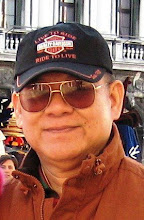


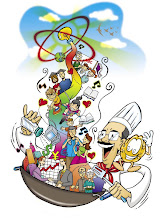
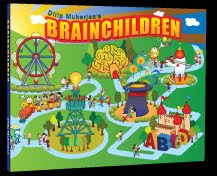



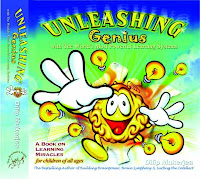
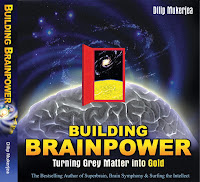
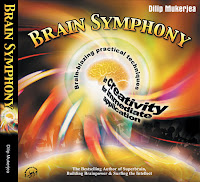





No comments:
Post a Comment